Comprehensive Analysis of International Healthcare Policies: A Report
VerifiedAdded on 2019/12/28
|10
|2796
|293
Report
AI Summary
This report provides a comprehensive overview of international healthcare policies, exploring various approaches to policy formation, including national health services and private healthcare. It delves into funding mechanisms such as public and private funding, and examines the impact of cultural and societal factors on healthcare, using the Igbo culture in England as an example. The report further analyzes the influence of education and social class on healthcare access and satisfaction. It discusses the translation of healthcare policies in an international context, highlighting the roles of organizations like the WHO and NHS, as well as barriers to healthcare provision. The report also addresses socio-political issues in public health promotion, UK healthcare policies, and the impact of health promotion on healthcare services. Finally, it examines contemporary issues in health and social care, such as information security and stress, and proposes solutions through training and improved management.
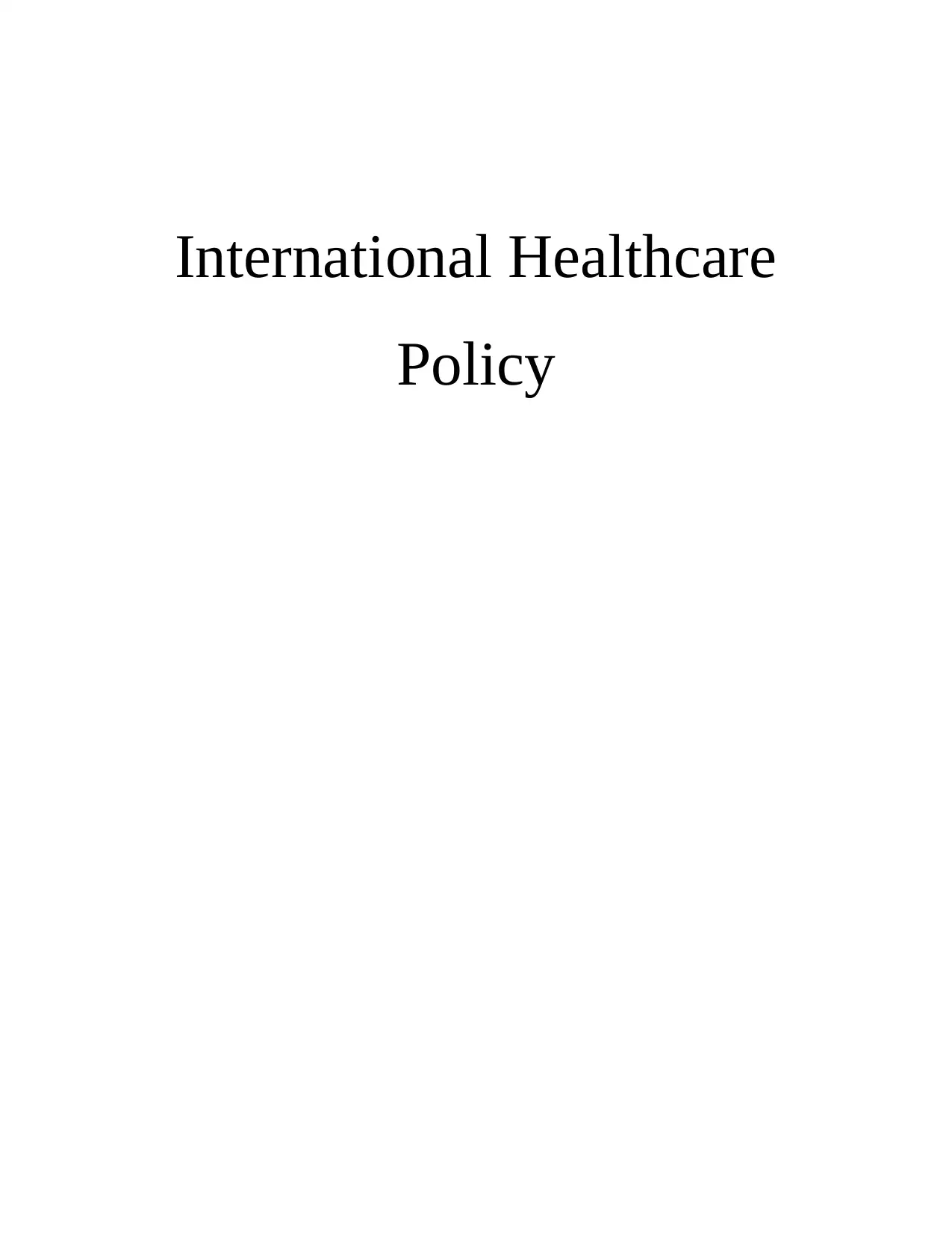
International Healthcare
Policy
Policy
Paraphrase This Document
Need a fresh take? Get an instant paraphrase of this document with our AI Paraphraser
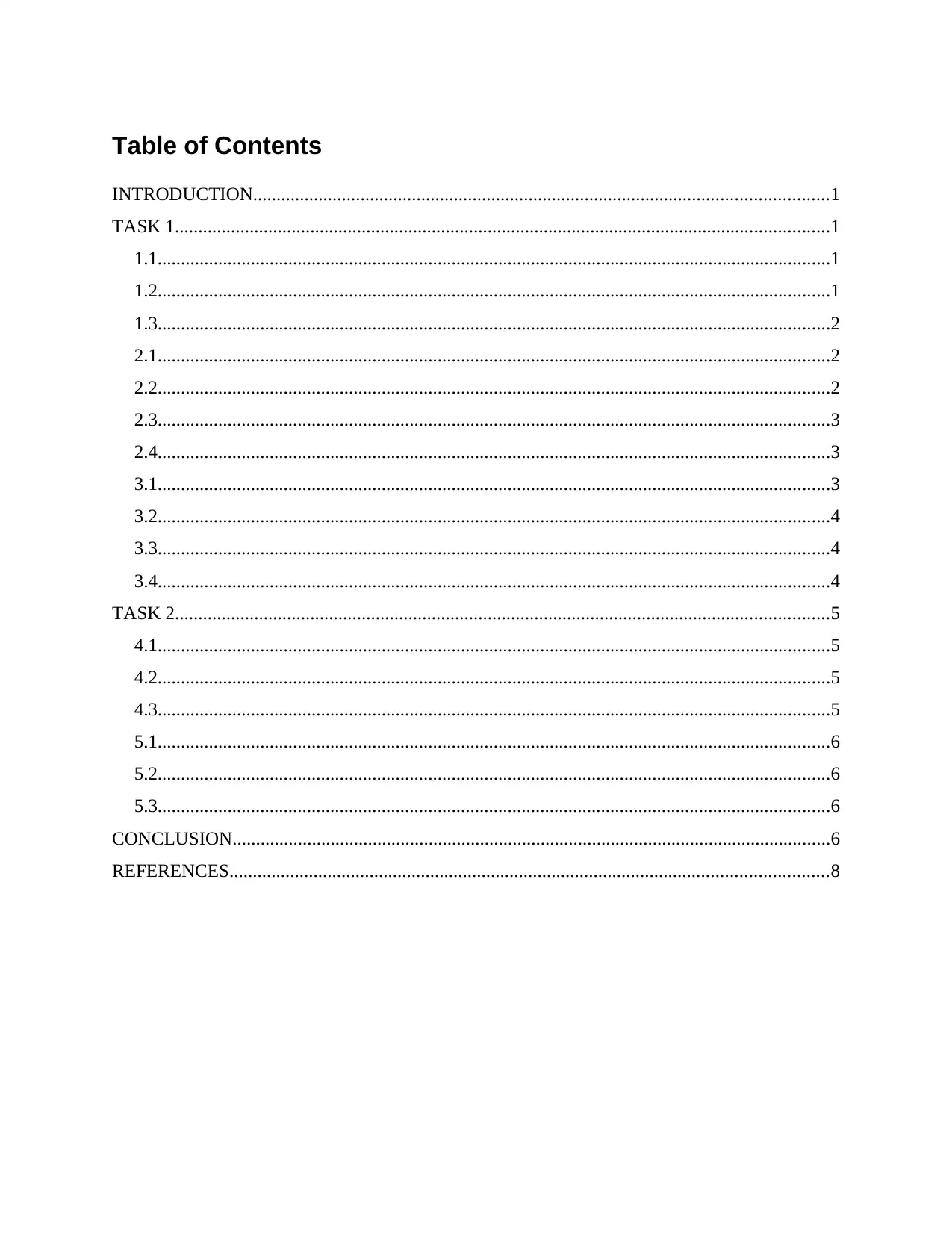
Table of Contents
INTRODUCTION...........................................................................................................................1
TASK 1............................................................................................................................................1
1.1................................................................................................................................................1
1.2................................................................................................................................................1
1.3................................................................................................................................................2
2.1................................................................................................................................................2
2.2................................................................................................................................................2
2.3................................................................................................................................................3
2.4................................................................................................................................................3
3.1................................................................................................................................................3
3.2................................................................................................................................................4
3.3................................................................................................................................................4
3.4................................................................................................................................................4
TASK 2............................................................................................................................................5
4.1................................................................................................................................................5
4.2................................................................................................................................................5
4.3................................................................................................................................................5
5.1................................................................................................................................................6
5.2................................................................................................................................................6
5.3................................................................................................................................................6
CONCLUSION................................................................................................................................6
REFERENCES................................................................................................................................8
INTRODUCTION...........................................................................................................................1
TASK 1............................................................................................................................................1
1.1................................................................................................................................................1
1.2................................................................................................................................................1
1.3................................................................................................................................................2
2.1................................................................................................................................................2
2.2................................................................................................................................................2
2.3................................................................................................................................................3
2.4................................................................................................................................................3
3.1................................................................................................................................................3
3.2................................................................................................................................................4
3.3................................................................................................................................................4
3.4................................................................................................................................................4
TASK 2............................................................................................................................................5
4.1................................................................................................................................................5
4.2................................................................................................................................................5
4.3................................................................................................................................................5
5.1................................................................................................................................................6
5.2................................................................................................................................................6
5.3................................................................................................................................................6
CONCLUSION................................................................................................................................6
REFERENCES................................................................................................................................8
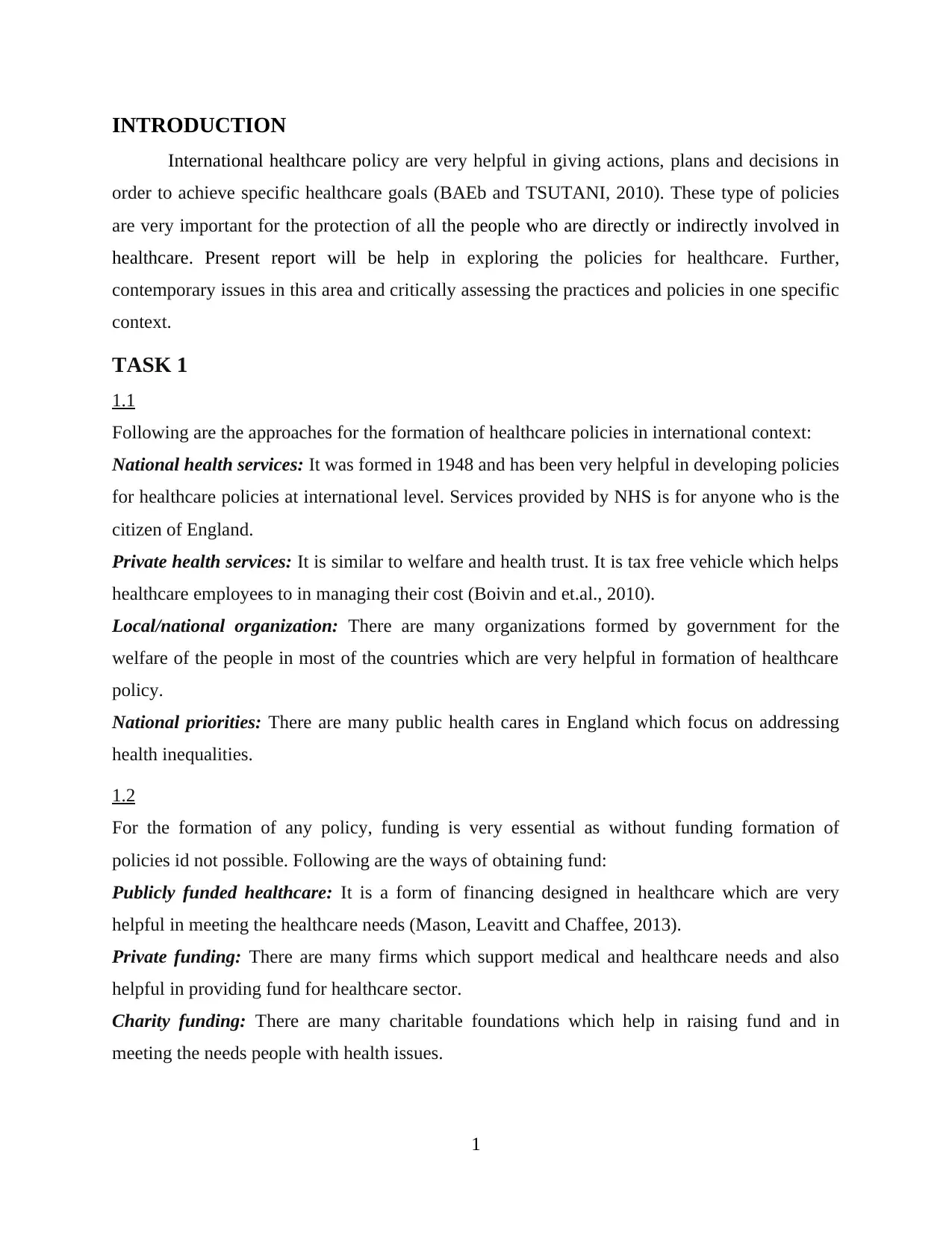
INTRODUCTION
International healthcare policy are very helpful in giving actions, plans and decisions in
order to achieve specific healthcare goals (BAEb and TSUTANI, 2010). These type of policies
are very important for the protection of all the people who are directly or indirectly involved in
healthcare. Present report will be help in exploring the policies for healthcare. Further,
contemporary issues in this area and critically assessing the practices and policies in one specific
context.
TASK 1
1.1
Following are the approaches for the formation of healthcare policies in international context:
National health services: It was formed in 1948 and has been very helpful in developing policies
for healthcare policies at international level. Services provided by NHS is for anyone who is the
citizen of England.
Private health services: It is similar to welfare and health trust. It is tax free vehicle which helps
healthcare employees to in managing their cost (Boivin and et.al., 2010).
Local/national organization: There are many organizations formed by government for the
welfare of the people in most of the countries which are very helpful in formation of healthcare
policy.
National priorities: There are many public health cares in England which focus on addressing
health inequalities.
1.2
For the formation of any policy, funding is very essential as without funding formation of
policies id not possible. Following are the ways of obtaining fund:
Publicly funded healthcare: It is a form of financing designed in healthcare which are very
helpful in meeting the healthcare needs (Mason, Leavitt and Chaffee, 2013).
Private funding: There are many firms which support medical and healthcare needs and also
helpful in providing fund for healthcare sector.
Charity funding: There are many charitable foundations which help in raising fund and in
meeting the needs people with health issues.
1
International healthcare policy are very helpful in giving actions, plans and decisions in
order to achieve specific healthcare goals (BAEb and TSUTANI, 2010). These type of policies
are very important for the protection of all the people who are directly or indirectly involved in
healthcare. Present report will be help in exploring the policies for healthcare. Further,
contemporary issues in this area and critically assessing the practices and policies in one specific
context.
TASK 1
1.1
Following are the approaches for the formation of healthcare policies in international context:
National health services: It was formed in 1948 and has been very helpful in developing policies
for healthcare policies at international level. Services provided by NHS is for anyone who is the
citizen of England.
Private health services: It is similar to welfare and health trust. It is tax free vehicle which helps
healthcare employees to in managing their cost (Boivin and et.al., 2010).
Local/national organization: There are many organizations formed by government for the
welfare of the people in most of the countries which are very helpful in formation of healthcare
policy.
National priorities: There are many public health cares in England which focus on addressing
health inequalities.
1.2
For the formation of any policy, funding is very essential as without funding formation of
policies id not possible. Following are the ways of obtaining fund:
Publicly funded healthcare: It is a form of financing designed in healthcare which are very
helpful in meeting the healthcare needs (Mason, Leavitt and Chaffee, 2013).
Private funding: There are many firms which support medical and healthcare needs and also
helpful in providing fund for healthcare sector.
Charity funding: There are many charitable foundations which help in raising fund and in
meeting the needs people with health issues.
1
⊘ This is a preview!⊘
Do you want full access?
Subscribe today to unlock all pages.

Trusted by 1+ million students worldwide
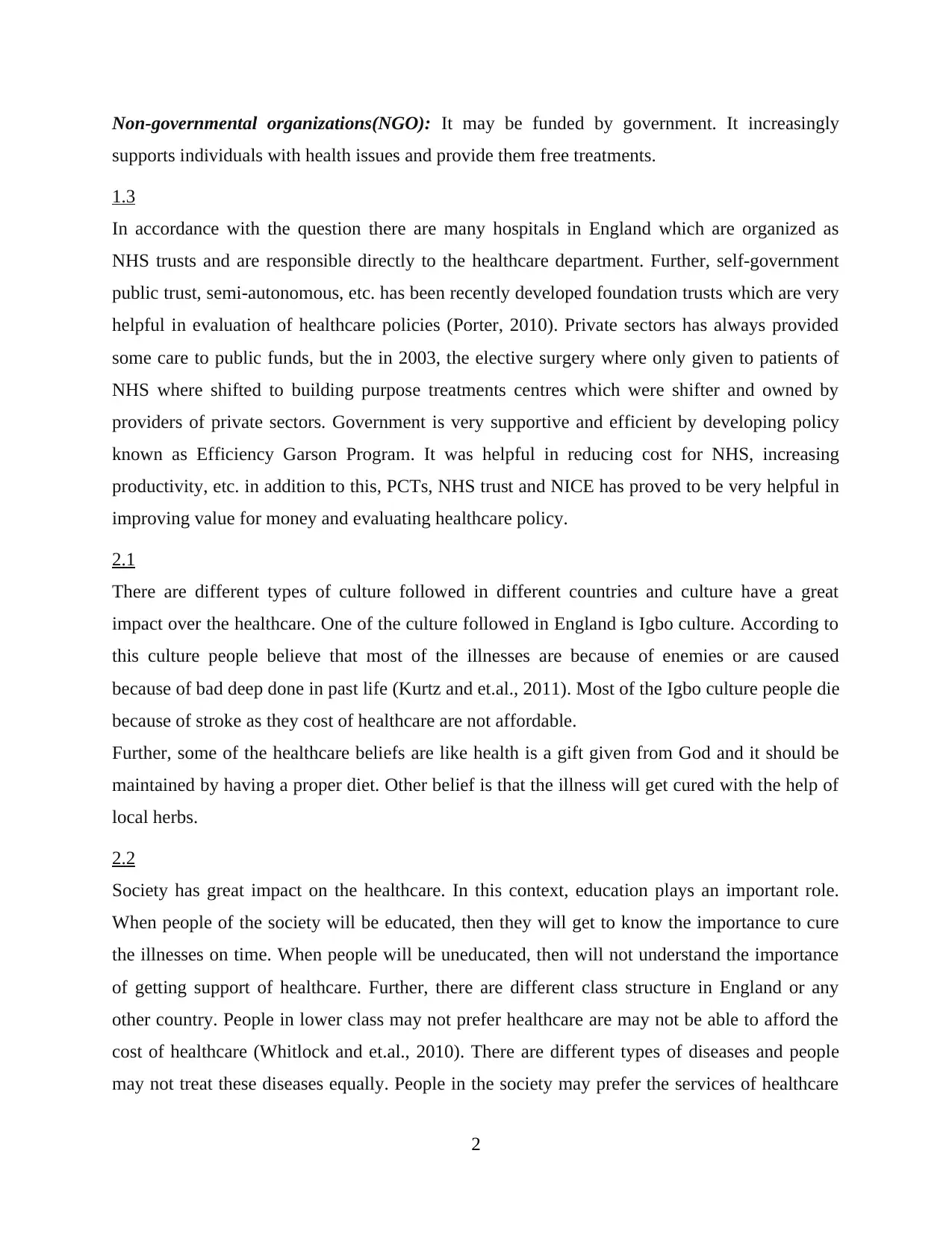
Non-governmental organizations(NGO): It may be funded by government. It increasingly
supports individuals with health issues and provide them free treatments.
1.3
In accordance with the question there are many hospitals in England which are organized as
NHS trusts and are responsible directly to the healthcare department. Further, self-government
public trust, semi-autonomous, etc. has been recently developed foundation trusts which are very
helpful in evaluation of healthcare policies (Porter, 2010). Private sectors has always provided
some care to public funds, but the in 2003, the elective surgery where only given to patients of
NHS where shifted to building purpose treatments centres which were shifter and owned by
providers of private sectors. Government is very supportive and efficient by developing policy
known as Efficiency Garson Program. It was helpful in reducing cost for NHS, increasing
productivity, etc. in addition to this, PCTs, NHS trust and NICE has proved to be very helpful in
improving value for money and evaluating healthcare policy.
2.1
There are different types of culture followed in different countries and culture have a great
impact over the healthcare. One of the culture followed in England is Igbo culture. According to
this culture people believe that most of the illnesses are because of enemies or are caused
because of bad deep done in past life (Kurtz and et.al., 2011). Most of the Igbo culture people die
because of stroke as they cost of healthcare are not affordable.
Further, some of the healthcare beliefs are like health is a gift given from God and it should be
maintained by having a proper diet. Other belief is that the illness will get cured with the help of
local herbs.
2.2
Society has great impact on the healthcare. In this context, education plays an important role.
When people of the society will be educated, then they will get to know the importance to cure
the illnesses on time. When people will be uneducated, then will not understand the importance
of getting support of healthcare. Further, there are different class structure in England or any
other country. People in lower class may not prefer healthcare are may not be able to afford the
cost of healthcare (Whitlock and et.al., 2010). There are different types of diseases and people
may not treat these diseases equally. People in the society may prefer the services of healthcare
2
supports individuals with health issues and provide them free treatments.
1.3
In accordance with the question there are many hospitals in England which are organized as
NHS trusts and are responsible directly to the healthcare department. Further, self-government
public trust, semi-autonomous, etc. has been recently developed foundation trusts which are very
helpful in evaluation of healthcare policies (Porter, 2010). Private sectors has always provided
some care to public funds, but the in 2003, the elective surgery where only given to patients of
NHS where shifted to building purpose treatments centres which were shifter and owned by
providers of private sectors. Government is very supportive and efficient by developing policy
known as Efficiency Garson Program. It was helpful in reducing cost for NHS, increasing
productivity, etc. in addition to this, PCTs, NHS trust and NICE has proved to be very helpful in
improving value for money and evaluating healthcare policy.
2.1
There are different types of culture followed in different countries and culture have a great
impact over the healthcare. One of the culture followed in England is Igbo culture. According to
this culture people believe that most of the illnesses are because of enemies or are caused
because of bad deep done in past life (Kurtz and et.al., 2011). Most of the Igbo culture people die
because of stroke as they cost of healthcare are not affordable.
Further, some of the healthcare beliefs are like health is a gift given from God and it should be
maintained by having a proper diet. Other belief is that the illness will get cured with the help of
local herbs.
2.2
Society has great impact on the healthcare. In this context, education plays an important role.
When people of the society will be educated, then they will get to know the importance to cure
the illnesses on time. When people will be uneducated, then will not understand the importance
of getting support of healthcare. Further, there are different class structure in England or any
other country. People in lower class may not prefer healthcare are may not be able to afford the
cost of healthcare (Whitlock and et.al., 2010). There are different types of diseases and people
may not treat these diseases equally. People in the society may prefer the services of healthcare
2
Paraphrase This Document
Need a fresh take? Get an instant paraphrase of this document with our AI Paraphraser
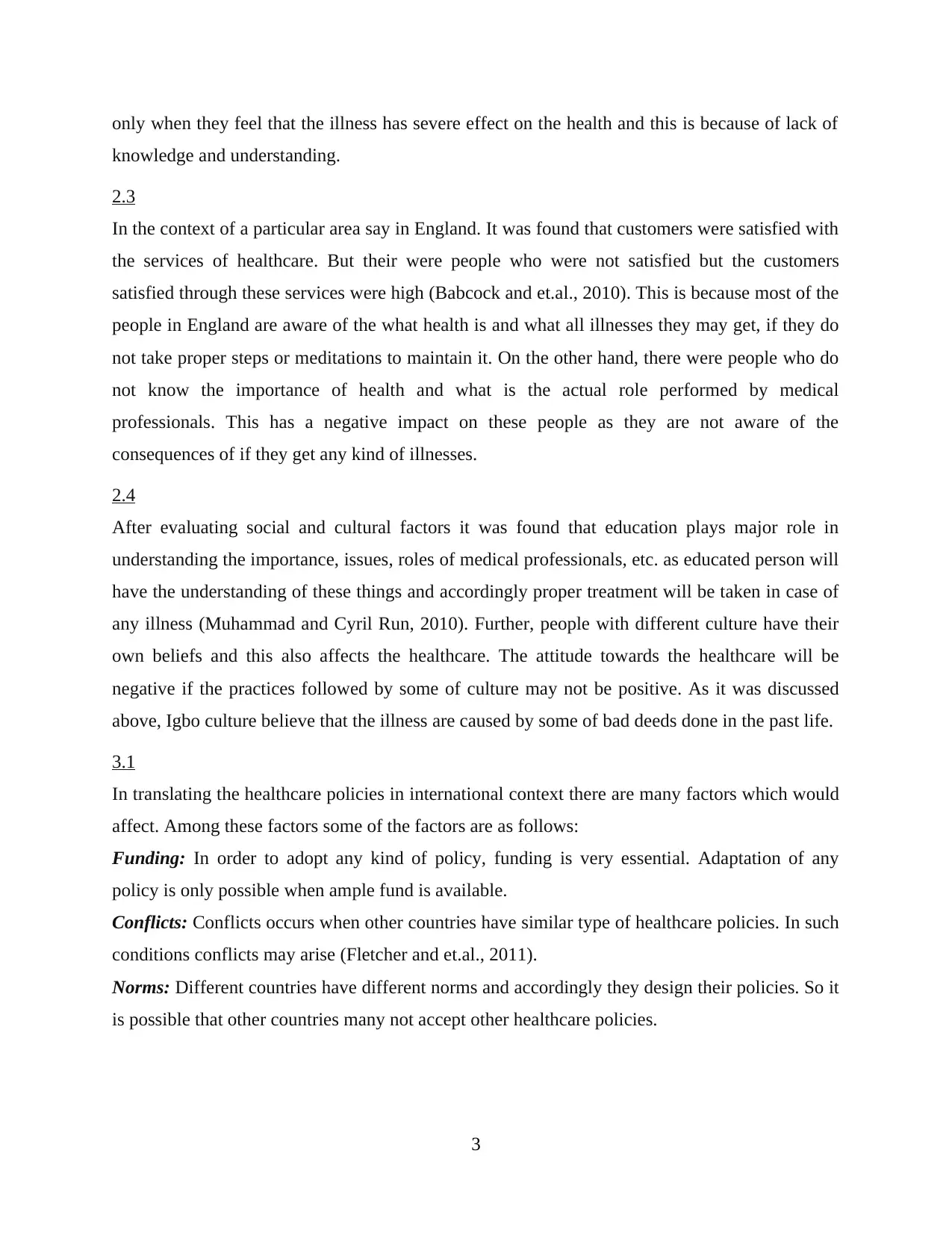
only when they feel that the illness has severe effect on the health and this is because of lack of
knowledge and understanding.
2.3
In the context of a particular area say in England. It was found that customers were satisfied with
the services of healthcare. But their were people who were not satisfied but the customers
satisfied through these services were high (Babcock and et.al., 2010). This is because most of the
people in England are aware of the what health is and what all illnesses they may get, if they do
not take proper steps or meditations to maintain it. On the other hand, there were people who do
not know the importance of health and what is the actual role performed by medical
professionals. This has a negative impact on these people as they are not aware of the
consequences of if they get any kind of illnesses.
2.4
After evaluating social and cultural factors it was found that education plays major role in
understanding the importance, issues, roles of medical professionals, etc. as educated person will
have the understanding of these things and accordingly proper treatment will be taken in case of
any illness (Muhammad and Cyril Run, 2010). Further, people with different culture have their
own beliefs and this also affects the healthcare. The attitude towards the healthcare will be
negative if the practices followed by some of culture may not be positive. As it was discussed
above, Igbo culture believe that the illness are caused by some of bad deeds done in the past life.
3.1
In translating the healthcare policies in international context there are many factors which would
affect. Among these factors some of the factors are as follows:
Funding: In order to adopt any kind of policy, funding is very essential. Adaptation of any
policy is only possible when ample fund is available.
Conflicts: Conflicts occurs when other countries have similar type of healthcare policies. In such
conditions conflicts may arise (Fletcher and et.al., 2011).
Norms: Different countries have different norms and accordingly they design their policies. So it
is possible that other countries many not accept other healthcare policies.
3
knowledge and understanding.
2.3
In the context of a particular area say in England. It was found that customers were satisfied with
the services of healthcare. But their were people who were not satisfied but the customers
satisfied through these services were high (Babcock and et.al., 2010). This is because most of the
people in England are aware of the what health is and what all illnesses they may get, if they do
not take proper steps or meditations to maintain it. On the other hand, there were people who do
not know the importance of health and what is the actual role performed by medical
professionals. This has a negative impact on these people as they are not aware of the
consequences of if they get any kind of illnesses.
2.4
After evaluating social and cultural factors it was found that education plays major role in
understanding the importance, issues, roles of medical professionals, etc. as educated person will
have the understanding of these things and accordingly proper treatment will be taken in case of
any illness (Muhammad and Cyril Run, 2010). Further, people with different culture have their
own beliefs and this also affects the healthcare. The attitude towards the healthcare will be
negative if the practices followed by some of culture may not be positive. As it was discussed
above, Igbo culture believe that the illness are caused by some of bad deeds done in the past life.
3.1
In translating the healthcare policies in international context there are many factors which would
affect. Among these factors some of the factors are as follows:
Funding: In order to adopt any kind of policy, funding is very essential. Adaptation of any
policy is only possible when ample fund is available.
Conflicts: Conflicts occurs when other countries have similar type of healthcare policies. In such
conditions conflicts may arise (Fletcher and et.al., 2011).
Norms: Different countries have different norms and accordingly they design their policies. So it
is possible that other countries many not accept other healthcare policies.
3
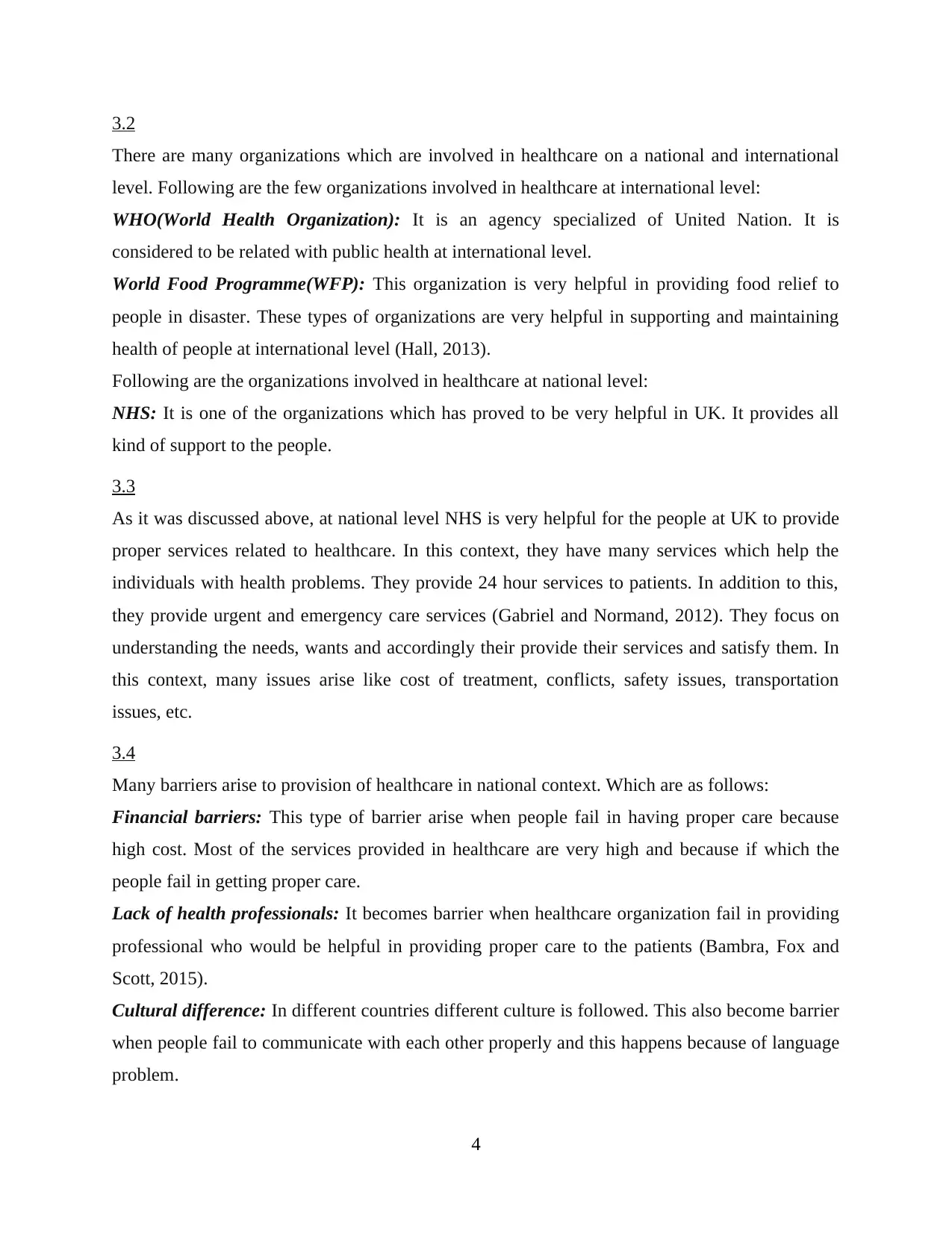
3.2
There are many organizations which are involved in healthcare on a national and international
level. Following are the few organizations involved in healthcare at international level:
WHO(World Health Organization): It is an agency specialized of United Nation. It is
considered to be related with public health at international level.
World Food Programme(WFP): This organization is very helpful in providing food relief to
people in disaster. These types of organizations are very helpful in supporting and maintaining
health of people at international level (Hall, 2013).
Following are the organizations involved in healthcare at national level:
NHS: It is one of the organizations which has proved to be very helpful in UK. It provides all
kind of support to the people.
3.3
As it was discussed above, at national level NHS is very helpful for the people at UK to provide
proper services related to healthcare. In this context, they have many services which help the
individuals with health problems. They provide 24 hour services to patients. In addition to this,
they provide urgent and emergency care services (Gabriel and Normand, 2012). They focus on
understanding the needs, wants and accordingly their provide their services and satisfy them. In
this context, many issues arise like cost of treatment, conflicts, safety issues, transportation
issues, etc.
3.4
Many barriers arise to provision of healthcare in national context. Which are as follows:
Financial barriers: This type of barrier arise when people fail in having proper care because
high cost. Most of the services provided in healthcare are very high and because if which the
people fail in getting proper care.
Lack of health professionals: It becomes barrier when healthcare organization fail in providing
professional who would be helpful in providing proper care to the patients (Bambra, Fox and
Scott, 2015).
Cultural difference: In different countries different culture is followed. This also become barrier
when people fail to communicate with each other properly and this happens because of language
problem.
4
There are many organizations which are involved in healthcare on a national and international
level. Following are the few organizations involved in healthcare at international level:
WHO(World Health Organization): It is an agency specialized of United Nation. It is
considered to be related with public health at international level.
World Food Programme(WFP): This organization is very helpful in providing food relief to
people in disaster. These types of organizations are very helpful in supporting and maintaining
health of people at international level (Hall, 2013).
Following are the organizations involved in healthcare at national level:
NHS: It is one of the organizations which has proved to be very helpful in UK. It provides all
kind of support to the people.
3.3
As it was discussed above, at national level NHS is very helpful for the people at UK to provide
proper services related to healthcare. In this context, they have many services which help the
individuals with health problems. They provide 24 hour services to patients. In addition to this,
they provide urgent and emergency care services (Gabriel and Normand, 2012). They focus on
understanding the needs, wants and accordingly their provide their services and satisfy them. In
this context, many issues arise like cost of treatment, conflicts, safety issues, transportation
issues, etc.
3.4
Many barriers arise to provision of healthcare in national context. Which are as follows:
Financial barriers: This type of barrier arise when people fail in having proper care because
high cost. Most of the services provided in healthcare are very high and because if which the
people fail in getting proper care.
Lack of health professionals: It becomes barrier when healthcare organization fail in providing
professional who would be helpful in providing proper care to the patients (Bambra, Fox and
Scott, 2015).
Cultural difference: In different countries different culture is followed. This also become barrier
when people fail to communicate with each other properly and this happens because of language
problem.
4
⊘ This is a preview!⊘
Do you want full access?
Subscribe today to unlock all pages.

Trusted by 1+ million students worldwide
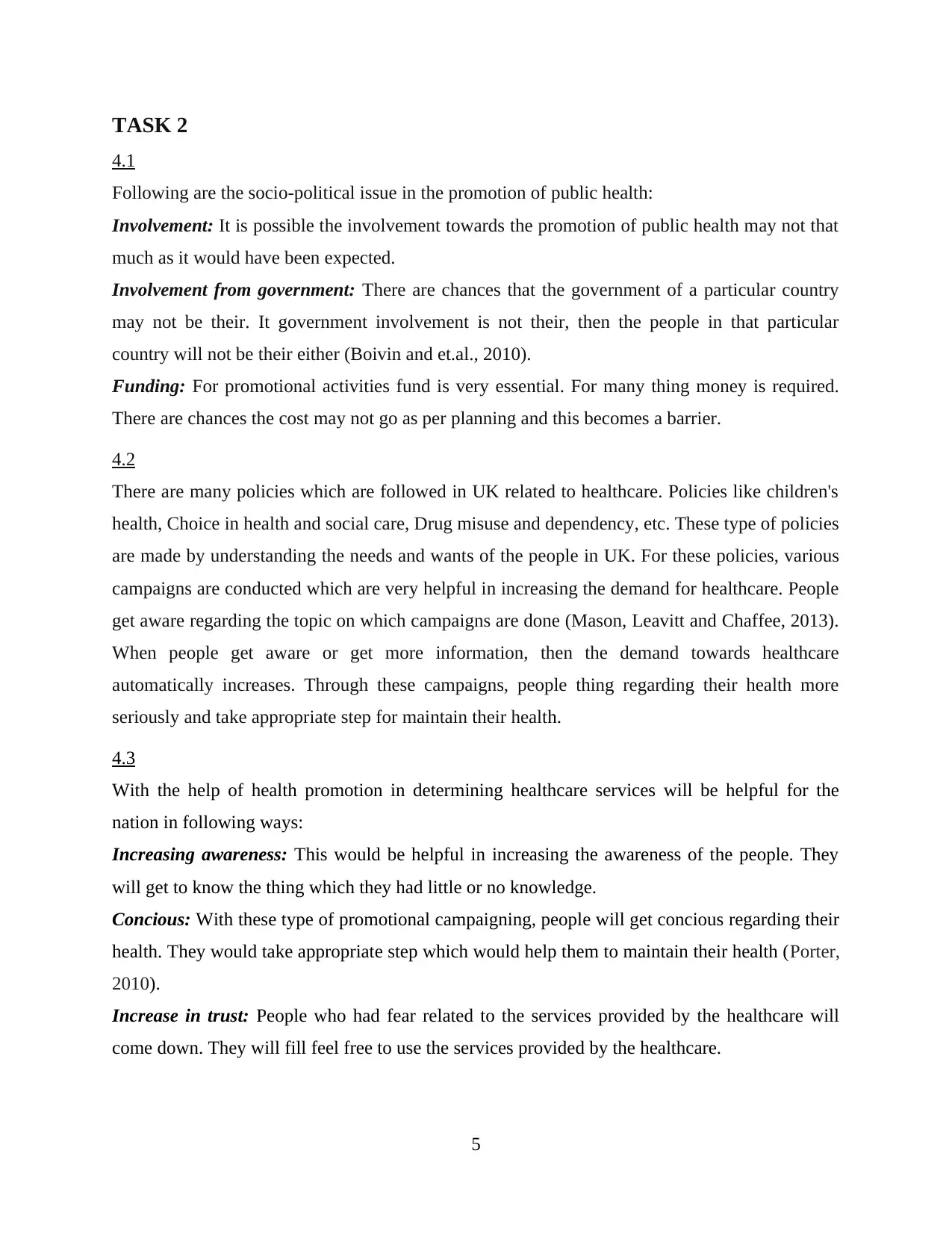
TASK 2
4.1
Following are the socio-political issue in the promotion of public health:
Involvement: It is possible the involvement towards the promotion of public health may not that
much as it would have been expected.
Involvement from government: There are chances that the government of a particular country
may not be their. It government involvement is not their, then the people in that particular
country will not be their either (Boivin and et.al., 2010).
Funding: For promotional activities fund is very essential. For many thing money is required.
There are chances the cost may not go as per planning and this becomes a barrier.
4.2
There are many policies which are followed in UK related to healthcare. Policies like children's
health, Choice in health and social care, Drug misuse and dependency, etc. These type of policies
are made by understanding the needs and wants of the people in UK. For these policies, various
campaigns are conducted which are very helpful in increasing the demand for healthcare. People
get aware regarding the topic on which campaigns are done (Mason, Leavitt and Chaffee, 2013).
When people get aware or get more information, then the demand towards healthcare
automatically increases. Through these campaigns, people thing regarding their health more
seriously and take appropriate step for maintain their health.
4.3
With the help of health promotion in determining healthcare services will be helpful for the
nation in following ways:
Increasing awareness: This would be helpful in increasing the awareness of the people. They
will get to know the thing which they had little or no knowledge.
Concious: With these type of promotional campaigning, people will get concious regarding their
health. They would take appropriate step which would help them to maintain their health (Porter,
2010).
Increase in trust: People who had fear related to the services provided by the healthcare will
come down. They will fill feel free to use the services provided by the healthcare.
5
4.1
Following are the socio-political issue in the promotion of public health:
Involvement: It is possible the involvement towards the promotion of public health may not that
much as it would have been expected.
Involvement from government: There are chances that the government of a particular country
may not be their. It government involvement is not their, then the people in that particular
country will not be their either (Boivin and et.al., 2010).
Funding: For promotional activities fund is very essential. For many thing money is required.
There are chances the cost may not go as per planning and this becomes a barrier.
4.2
There are many policies which are followed in UK related to healthcare. Policies like children's
health, Choice in health and social care, Drug misuse and dependency, etc. These type of policies
are made by understanding the needs and wants of the people in UK. For these policies, various
campaigns are conducted which are very helpful in increasing the demand for healthcare. People
get aware regarding the topic on which campaigns are done (Mason, Leavitt and Chaffee, 2013).
When people get aware or get more information, then the demand towards healthcare
automatically increases. Through these campaigns, people thing regarding their health more
seriously and take appropriate step for maintain their health.
4.3
With the help of health promotion in determining healthcare services will be helpful for the
nation in following ways:
Increasing awareness: This would be helpful in increasing the awareness of the people. They
will get to know the thing which they had little or no knowledge.
Concious: With these type of promotional campaigning, people will get concious regarding their
health. They would take appropriate step which would help them to maintain their health (Porter,
2010).
Increase in trust: People who had fear related to the services provided by the healthcare will
come down. They will fill feel free to use the services provided by the healthcare.
5
Paraphrase This Document
Need a fresh take? Get an instant paraphrase of this document with our AI Paraphraser
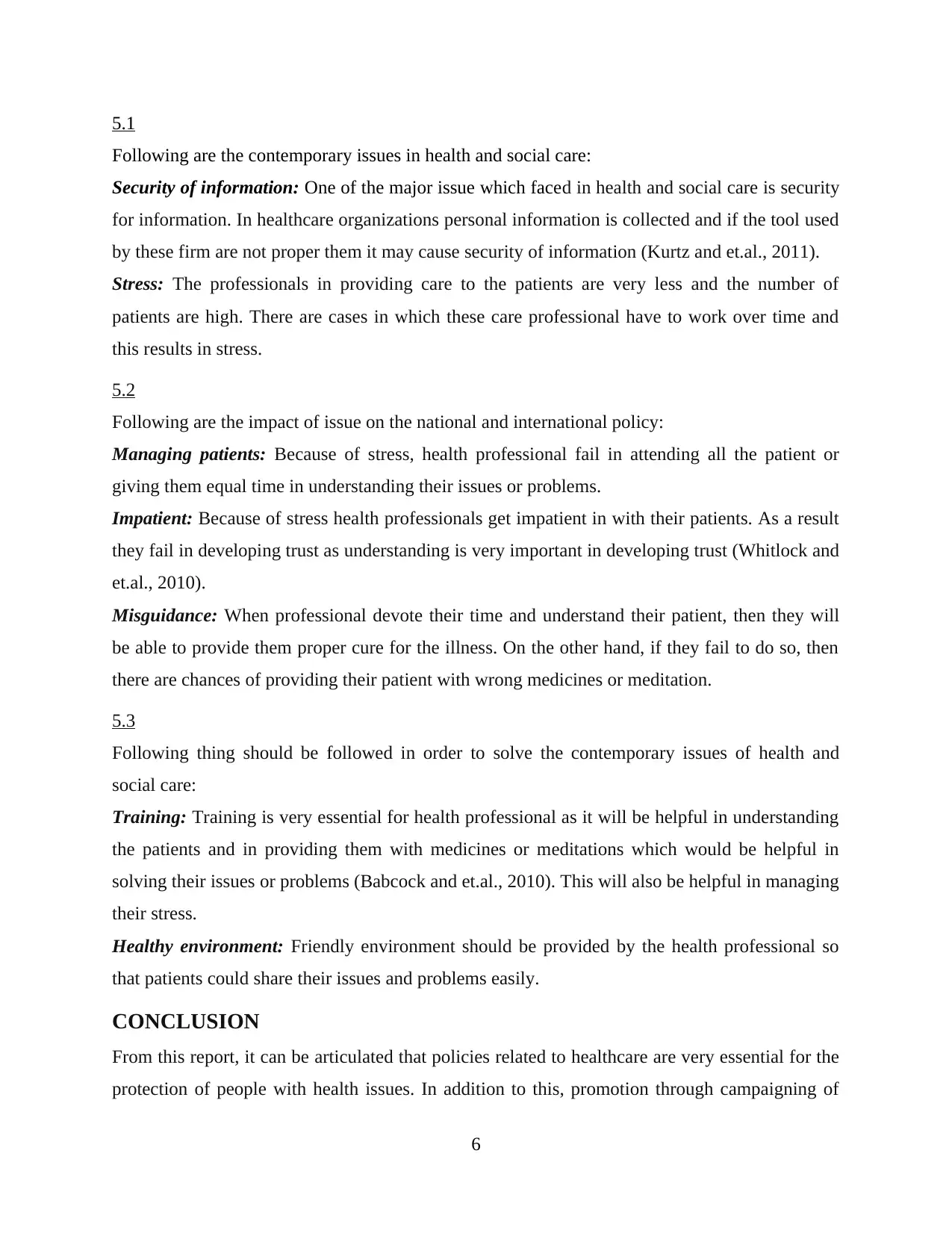
5.1
Following are the contemporary issues in health and social care:
Security of information: One of the major issue which faced in health and social care is security
for information. In healthcare organizations personal information is collected and if the tool used
by these firm are not proper them it may cause security of information (Kurtz and et.al., 2011).
Stress: The professionals in providing care to the patients are very less and the number of
patients are high. There are cases in which these care professional have to work over time and
this results in stress.
5.2
Following are the impact of issue on the national and international policy:
Managing patients: Because of stress, health professional fail in attending all the patient or
giving them equal time in understanding their issues or problems.
Impatient: Because of stress health professionals get impatient in with their patients. As a result
they fail in developing trust as understanding is very important in developing trust (Whitlock and
et.al., 2010).
Misguidance: When professional devote their time and understand their patient, then they will
be able to provide them proper cure for the illness. On the other hand, if they fail to do so, then
there are chances of providing their patient with wrong medicines or meditation.
5.3
Following thing should be followed in order to solve the contemporary issues of health and
social care:
Training: Training is very essential for health professional as it will be helpful in understanding
the patients and in providing them with medicines or meditations which would be helpful in
solving their issues or problems (Babcock and et.al., 2010). This will also be helpful in managing
their stress.
Healthy environment: Friendly environment should be provided by the health professional so
that patients could share their issues and problems easily.
CONCLUSION
From this report, it can be articulated that policies related to healthcare are very essential for the
protection of people with health issues. In addition to this, promotion through campaigning of
6
Following are the contemporary issues in health and social care:
Security of information: One of the major issue which faced in health and social care is security
for information. In healthcare organizations personal information is collected and if the tool used
by these firm are not proper them it may cause security of information (Kurtz and et.al., 2011).
Stress: The professionals in providing care to the patients are very less and the number of
patients are high. There are cases in which these care professional have to work over time and
this results in stress.
5.2
Following are the impact of issue on the national and international policy:
Managing patients: Because of stress, health professional fail in attending all the patient or
giving them equal time in understanding their issues or problems.
Impatient: Because of stress health professionals get impatient in with their patients. As a result
they fail in developing trust as understanding is very important in developing trust (Whitlock and
et.al., 2010).
Misguidance: When professional devote their time and understand their patient, then they will
be able to provide them proper cure for the illness. On the other hand, if they fail to do so, then
there are chances of providing their patient with wrong medicines or meditation.
5.3
Following thing should be followed in order to solve the contemporary issues of health and
social care:
Training: Training is very essential for health professional as it will be helpful in understanding
the patients and in providing them with medicines or meditations which would be helpful in
solving their issues or problems (Babcock and et.al., 2010). This will also be helpful in managing
their stress.
Healthy environment: Friendly environment should be provided by the health professional so
that patients could share their issues and problems easily.
CONCLUSION
From this report, it can be articulated that policies related to healthcare are very essential for the
protection of people with health issues. In addition to this, promotion through campaigning of
6
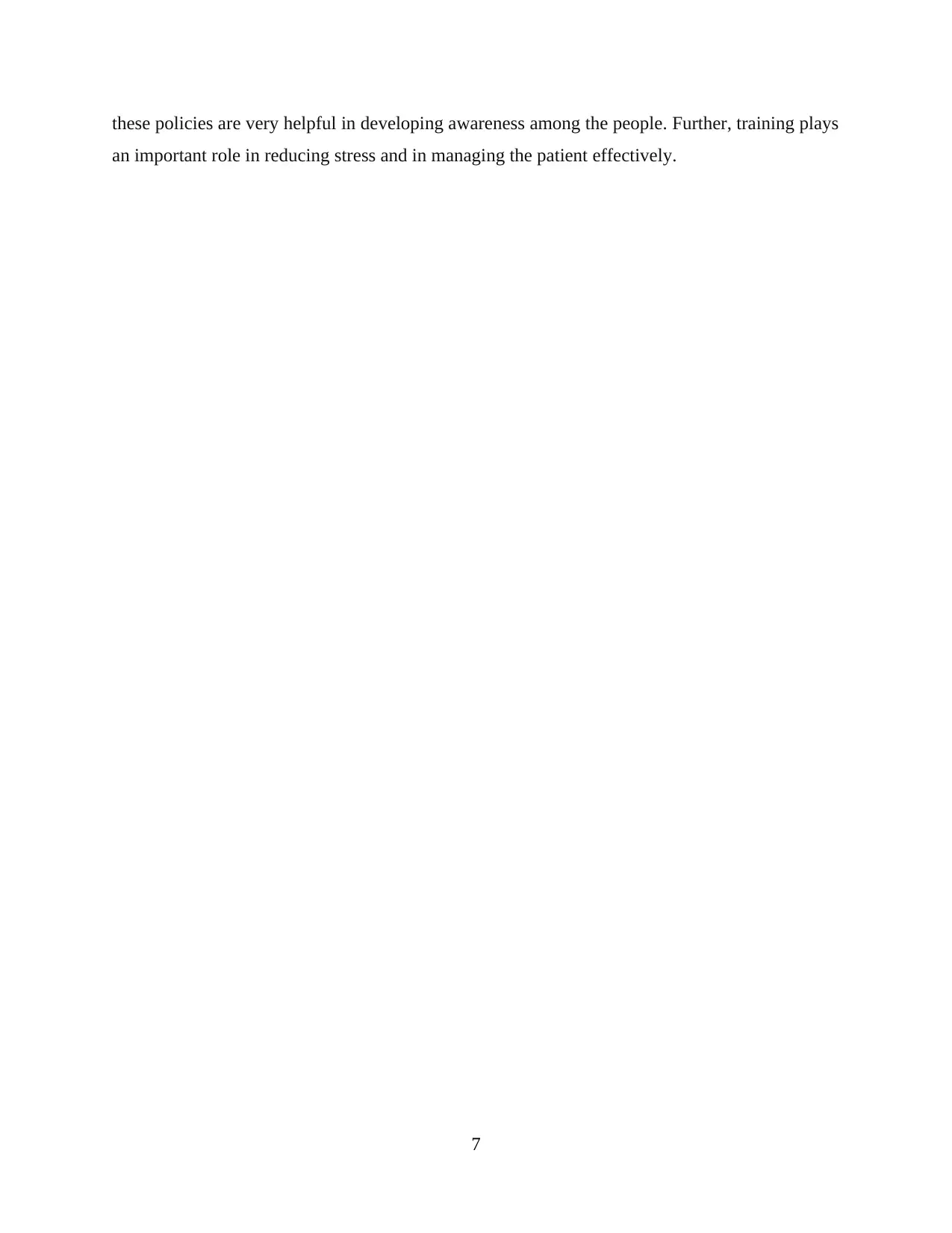
these policies are very helpful in developing awareness among the people. Further, training plays
an important role in reducing stress and in managing the patient effectively.
7
an important role in reducing stress and in managing the patient effectively.
7
⊘ This is a preview!⊘
Do you want full access?
Subscribe today to unlock all pages.

Trusted by 1+ million students worldwide
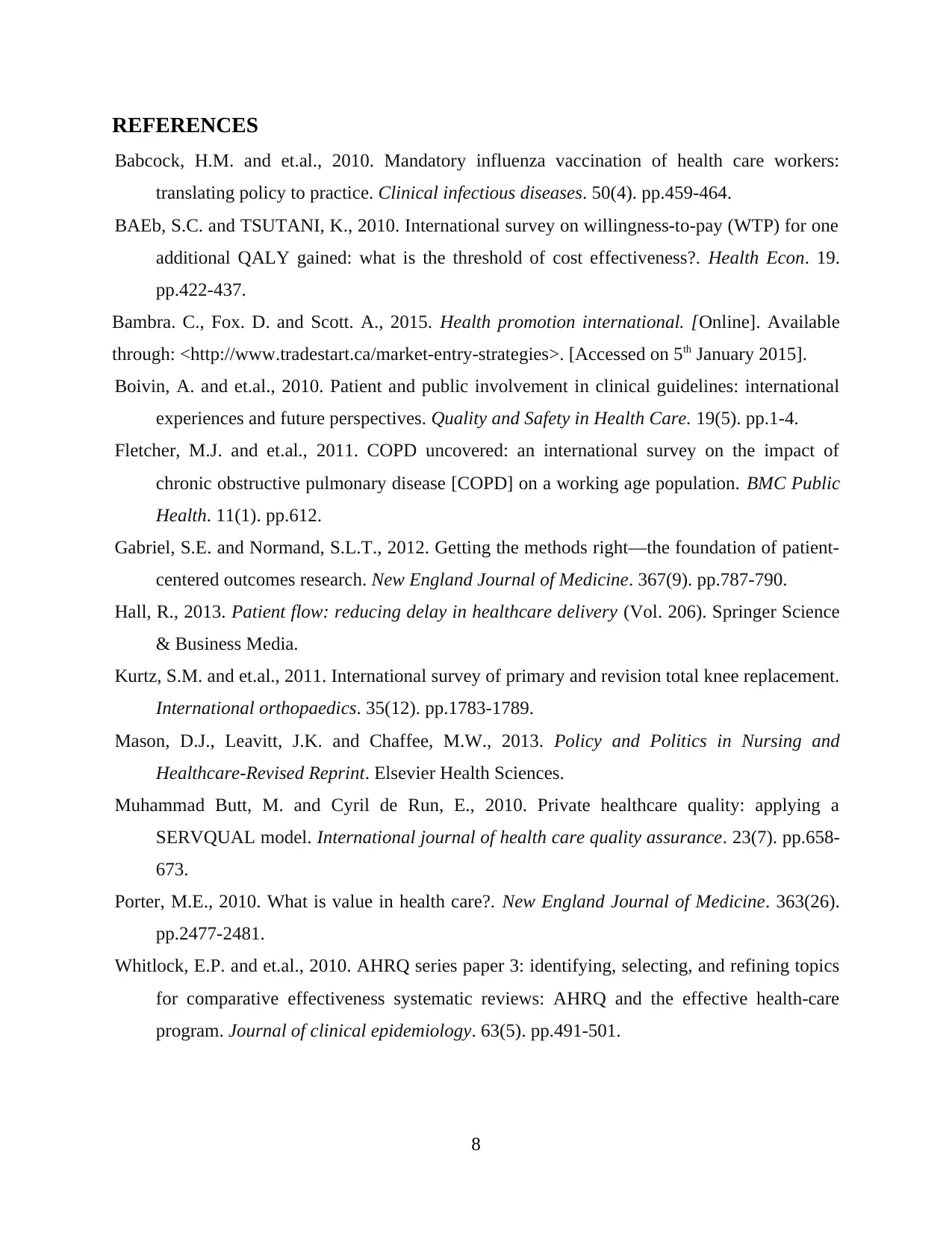
REFERENCES
Babcock, H.M. and et.al., 2010. Mandatory influenza vaccination of health care workers:
translating policy to practice. Clinical infectious diseases. 50(4). pp.459-464.
BAEb, S.C. and TSUTANI, K., 2010. International survey on willingness-to-pay (WTP) for one
additional QALY gained: what is the threshold of cost effectiveness?. Health Econ. 19.
pp.422-437.
Bambra. C., Fox. D. and Scott. A., 2015. Health promotion international. [Online]. Available
through: <http://www.tradestart.ca/market-entry-strategies>. [Accessed on 5th January 2015].
Boivin, A. and et.al., 2010. Patient and public involvement in clinical guidelines: international
experiences and future perspectives. Quality and Safety in Health Care. 19(5). pp.1-4.
Fletcher, M.J. and et.al., 2011. COPD uncovered: an international survey on the impact of
chronic obstructive pulmonary disease [COPD] on a working age population. BMC Public
Health. 11(1). pp.612.
Gabriel, S.E. and Normand, S.L.T., 2012. Getting the methods right—the foundation of patient-
centered outcomes research. New England Journal of Medicine. 367(9). pp.787-790.
Hall, R., 2013. Patient flow: reducing delay in healthcare delivery (Vol. 206). Springer Science
& Business Media.
Kurtz, S.M. and et.al., 2011. International survey of primary and revision total knee replacement.
International orthopaedics. 35(12). pp.1783-1789.
Mason, D.J., Leavitt, J.K. and Chaffee, M.W., 2013. Policy and Politics in Nursing and
Healthcare-Revised Reprint. Elsevier Health Sciences.
Muhammad Butt, M. and Cyril de Run, E., 2010. Private healthcare quality: applying a
SERVQUAL model. International journal of health care quality assurance. 23(7). pp.658-
673.
Porter, M.E., 2010. What is value in health care?. New England Journal of Medicine. 363(26).
pp.2477-2481.
Whitlock, E.P. and et.al., 2010. AHRQ series paper 3: identifying, selecting, and refining topics
for comparative effectiveness systematic reviews: AHRQ and the effective health-care
program. Journal of clinical epidemiology. 63(5). pp.491-501.
8
Babcock, H.M. and et.al., 2010. Mandatory influenza vaccination of health care workers:
translating policy to practice. Clinical infectious diseases. 50(4). pp.459-464.
BAEb, S.C. and TSUTANI, K., 2010. International survey on willingness-to-pay (WTP) for one
additional QALY gained: what is the threshold of cost effectiveness?. Health Econ. 19.
pp.422-437.
Bambra. C., Fox. D. and Scott. A., 2015. Health promotion international. [Online]. Available
through: <http://www.tradestart.ca/market-entry-strategies>. [Accessed on 5th January 2015].
Boivin, A. and et.al., 2010. Patient and public involvement in clinical guidelines: international
experiences and future perspectives. Quality and Safety in Health Care. 19(5). pp.1-4.
Fletcher, M.J. and et.al., 2011. COPD uncovered: an international survey on the impact of
chronic obstructive pulmonary disease [COPD] on a working age population. BMC Public
Health. 11(1). pp.612.
Gabriel, S.E. and Normand, S.L.T., 2012. Getting the methods right—the foundation of patient-
centered outcomes research. New England Journal of Medicine. 367(9). pp.787-790.
Hall, R., 2013. Patient flow: reducing delay in healthcare delivery (Vol. 206). Springer Science
& Business Media.
Kurtz, S.M. and et.al., 2011. International survey of primary and revision total knee replacement.
International orthopaedics. 35(12). pp.1783-1789.
Mason, D.J., Leavitt, J.K. and Chaffee, M.W., 2013. Policy and Politics in Nursing and
Healthcare-Revised Reprint. Elsevier Health Sciences.
Muhammad Butt, M. and Cyril de Run, E., 2010. Private healthcare quality: applying a
SERVQUAL model. International journal of health care quality assurance. 23(7). pp.658-
673.
Porter, M.E., 2010. What is value in health care?. New England Journal of Medicine. 363(26).
pp.2477-2481.
Whitlock, E.P. and et.al., 2010. AHRQ series paper 3: identifying, selecting, and refining topics
for comparative effectiveness systematic reviews: AHRQ and the effective health-care
program. Journal of clinical epidemiology. 63(5). pp.491-501.
8
1 out of 10
Related Documents
Your All-in-One AI-Powered Toolkit for Academic Success.
+13062052269
info@desklib.com
Available 24*7 on WhatsApp / Email
![[object Object]](/_next/static/media/star-bottom.7253800d.svg)
Unlock your academic potential
Copyright © 2020–2026 A2Z Services. All Rights Reserved. Developed and managed by ZUCOL.




